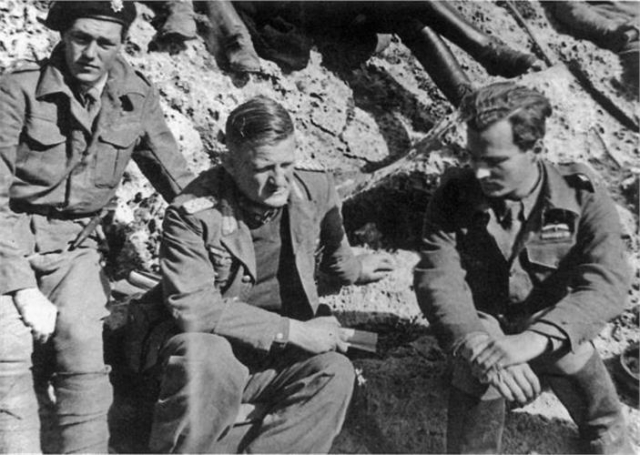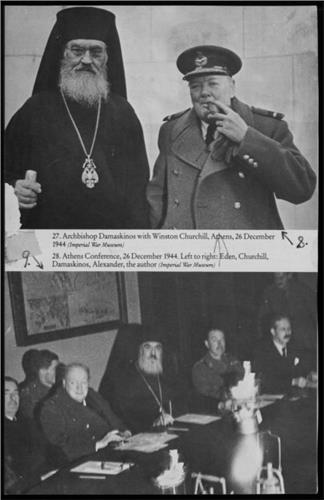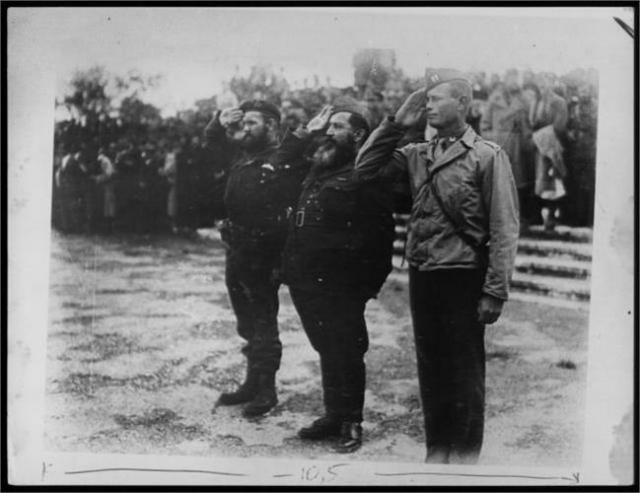Blowing up the bridge over Gorgopotamos river on 25 November 1942 was the first act of resistance against the Nazis in Europe, it was carried out by the Greek People's Liberation Army with the help of British commandos and spies.
Intelligence requires calmness. The work of a spy is to gather information. This person lives a double life, usually maintaining a normal profile in front of the people and family. If all this is true today, it was certainly valid during the occupation of Greece at the time of World War II, and especially when the most insignificant action could lead to an execution.
 It is morning at a central hotel in Athens. Professor of military and diplomatic history Andreas Gerolimatos from Simon Fraser University in Vancouver has prepared his lecture that he had recently delivered at Deree College. Its theme is his research and book "Shadow War: Intelligence in Occupied Greece, 1941-1944"(not yet translated into Greek). Smiling, he knowingly repeats the basic rules of spying.
It is morning at a central hotel in Athens. Professor of military and diplomatic history Andreas Gerolimatos from Simon Fraser University in Vancouver has prepared his lecture that he had recently delivered at Deree College. Its theme is his research and book "Shadow War: Intelligence in Occupied Greece, 1941-1944"(not yet translated into Greek). Smiling, he knowingly repeats the basic rules of spying.
In perfect Greek (although he has lived in Canada since the age of 6 and is now director of Stavros Niarchos Centre for Greek Language), Andreas Gerolimatos tells fascinating stories about spies, blunders, heroic deeds, failures, amid a prelude to the Cold war and during the time when the foundations of the latest Civil war in Greece (1946-1949) were laid.
However, let us go straight to the point by describing an almost cinematic atmosphere: First, from 1941 to 1944, the lion's share of intelligence activities in occupied Greece belonged to the British. An emblematic point was the abduction of General Heinrich Kreipe on the island of Crete in 1944, with the participation of local activists from the opposition, British commandos and, of course, writer and Major at the time Patrick Leigh Fermor.

Kidnapped General Heinrich Kreipe (in the centre)
The British intensified their efforts during the reign of Ioannis Metaxas (1936-1941) as they had no idea whether the dictator who came to power on 4 August 1936 would support the nascent Nazism or oppose it.
At that time, the Embassy was trying to establish contacts and writer Elie Papadimitriou liaised with the Greek Communist Party, which was illegal at that time, until the start of the Greek-Italian war. British contacts with the Greek Communist Party also continued when George Siandos was the party's secretary.
 In 1940, the British Intelligence Service - Special Operations Executive was established on the orders of Winston Churchill and many Greeks started cooperating with it.
In 1940, the British Intelligence Service - Special Operations Executive was established on the orders of Winston Churchill and many Greeks started cooperating with it.
"You should remember the following two names: Gerasimos Alexatos, a former smuggler who liaised with the British under the code name Odysseas. The second is that of General Euripides Bakirtzis who was involved in the anti-monarchist movement in 1935. He acted under the code name Prometheus and was the contact man with the Middle East", states professor Andreas Gerolimatos, adding, "Many Greeks were incited to cooperate with the secret services in the UK due to the fact that they were used to help the British escape from Greece. This endeavour involved many members of the middle class at the time and I would say that the former wealthy segments of the population were in the first ranks of the British intelligence." One should take into account the contradictions inside the British intelligence service as well as the nightmare of Nazi occupation in Greece to clarify how complex the situation was at that time.
For example, in 1942, Euripidis Bakirtzis escaped from Greece chased by the Germans and handed over his wireless telegraph to young naval officer Kutsoyiannopoulos, under the code name Prometheus 2. Meanwhile Gerasimos Alexatos contacted Andreas Tzimas from the Greek Communist Party. To make it clear: the broad anti-fascist front imposed by the USSR legitimized the Greek Communist Party and therefore it established contacts within alliances against Nazism. "In no case do we want to say that the Greek Communist Party was bought by the British. The British paid for purely practical reasons: the situation was terrible, the people were hungry and, during the occupation, things were equally bad for spies."
It is interesting to know how one could become a spy for the British at that time, in the early war years: "If someone wanted to form a reconnaissance section he sent a representative to the Middle East," says Andreas Gerolimatos. However, what was the work of a spy at the time? "It was to transmit information on the passing of enemy ships by wireless telegraph. And of course, sabotage," adds the historian who, while conducting his study, had the opportunity to take interviews from English veteran spies, speak in Oxford to an audience full of such (who are proud of the resistance activities but silent about them), and to get to know Chris Woodhouse, head of the British allied mission in Greece.

Napoleon Zervas (left) and Chris Woodhouse (right), head of the British allied mission in Greece.
And the exciting stories of spies begin: Ebullient John Atkinson, who had numerous conquests among the fair sex, was hiding from house to house in 1941. He departed by boat to Turkey, arrived in Alexandria and as soon as he was recruited as a spy, he was ordered to establish contact with Panagiotis Kanellopoulos, who was considered by the British as a moderate politician. "Atkinson would not do exactly what he had to. He established contacts but also participated in various sabotages like the one on the Cycladic islands against the ships of the Tripartite Pact for example. The starting point for him was Paros island." With other participants in the resistance he organized a base on the island but on 6 January 1942 there was a leak and the secret came to light (a girlfriend of his was jealous and betrayed him to the Italians). The Italians attacked a house where there was a group headed by Atkinson who killed their commander but was seriously wounded in the legs. He was arrested then. "He was something like James Bond, but very brave. The Italians began to admire him because every day different women came to him and brought him food. Eventually the Germans executed him in February 1943, when even the Italian judge wept", says Andreas Gerolimatos.